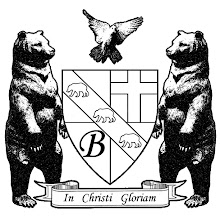 As part of his ongoing series of audiences about the Fathers of the Church, Pope Benedict XVI today presented a brief teaching on the life of St. Cyril of Alexandria:
As part of his ongoing series of audiences about the Fathers of the Church, Pope Benedict XVI today presented a brief teaching on the life of St. Cyril of Alexandria:"The subject of today's catechesis is Saint Cyril of Alexandria, known as the 'pillar of faith' and the 'seal of all the Fathers'. He was born somewhere between 370 and 380, and at a young age became Bishop of Alexandria. Cyril was a zealous defender of the faith. He took care to ensure that his theology was firmly situated within the tradition of the Church by referring to preceding ecclesiastical authorities, especially Athanasius. Through a series of letters countering the position of Nestorius, the Bishop of Constantinople, Cyril made a very significant contribution to Christology defending the divinity and humanity of Christ united in the one Lord, Christ and Son. He was also of utmost influence at the Council of Ephesus, supporting the recognition of the Virgin Mary as the 'Mother of God'. This led to the deposition of Nestorius as Bishop of Constantinople. Saint Cyril, a prolific writer whose works were read throughout the Church, was declared a Doctor of the Church by Pope Leo XIII in 1882. May our remembrance of this outstanding figure in the history of Christianity remind us that the centre of our faith is the encounter with Jesus Christ, who gives each one of us a new horizon and a decisive direction!"
I always think it's interesting to learn a little bit about the history of Christianity and see how God has worked through very real people and events to guide His Church and its understanding of Him. The Christian faith didn't just plop down from the sky neatly packaged, nor was it fabricated during the Middle Ages. Rather, the Church's understanding developed over time, and it continues to develop to this day.
It may seem like the debates with which the Church has concerned itself over the centuries have often been esoteric, irrelevant, and prone to hair-splitting. Why should we care, one might ask, whether Jesus was two persons, as Nestorius argued, or one person with two natures, as Cyril argued? What difference does it make?
The Church believes, however, that the truth matters a great deal. The truth is especially important when we're talking about the most important Being there is, and the Church will never shy away from seeking that truth.
(Incidentally, the debate between St. Cyril and Nestorius makes quite a big difference, but I don't think I'm qualified to go into much depth about it right now.)


No comments:
Post a Comment